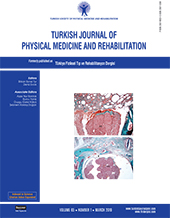Factors affecting functional outcome in patients with traumatic brain injury sequelae: Our single-center experiences on brain injury rehabilitation
2 Department of Physical Medicine and Rehabilitation, University of Health Sciences, Ankara, Turkey
3 Department of Physical Medicine and Rehabilitation, Medicana Hospital, Ankara, Turkey DOI : 10.5606/tftrd.2019.2281 Objectives: This study aims to investigate the effect of rehabilitation on functional level of traumatic brain injury (TBI) patients and to examine the associated factors on functional gain in this patient population.
Patients and methods: Between October 2010 and November 2015, a total of 71 patients (63 males, 8 females; mean age 26.6±8.1 years; range, 18 to 56 years) who were admitted to our rehabilitation clinic with moderate-to-severe TBI were retrospectively analyzed. Functional recovery was assessed using the Functional Independence Measure (FIM) and Functional Ambulation Classification (FAC) scales. The patients were divided into two groups according to time from TBI to the initiation of rehabilitation: early (<6 months) and late (≥6 months). Possible predictive factors associated with FIM gain were evaluated.
Results: There was a significant improvement in the FIM scores from admission to discharge (p<0.001). There was a statistically significant difference in the FIM gain and FIM efficiency between the patient groups according to the initiation of rehabilitation (p<0.001). The FAC scores increased from admission to discharge, showing statistical significance (p<0.001). Duration of rehabilitation, early rehabilitation, heterotopic ossification, and deep venous thrombosis were found to be significant factors associated with FIM gain (p<0.001).
Conclusion: Our study results suggest that rehabilitation is effective for functional gain, particularly in the early period in patients with moderateto- severe TBI and duration of rehabilitation, early rehabilitation, heterotopic ossification, and deep venous thrombosis are also predictors of functional improvement.
Keywords : Functional outcome, rehabilitation, traumatic brain injury

















